« adidas brand shines at Beijing 2008 Olympics | Main | PUMA Celebrates as 'Lightning' Bolt Strikes Twice With Historic Sprint Double for Jamaica »
August 20, 2008
Branding at the Olympics
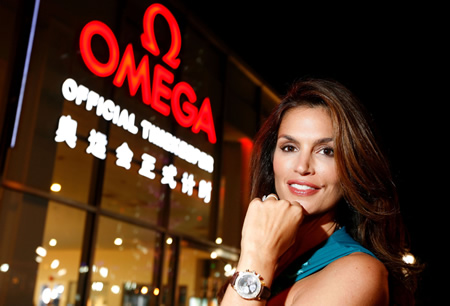
Photo: Cindy Crawford at the OMEGA Pavilion on the Olympic Green in Beijing on 14 August, 2008.
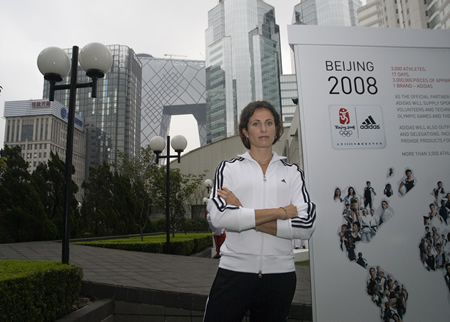
Photo: American pole-vault athlete Jennifer Stuczynski at adidas Brand Center in Beijing, China, August 11, 2008. At the center's Olympic Brand Launch Area, consumers can get close and personal with the special products, designs and technologies that adidas has developed for the Beijing 2008 Olympic Games.
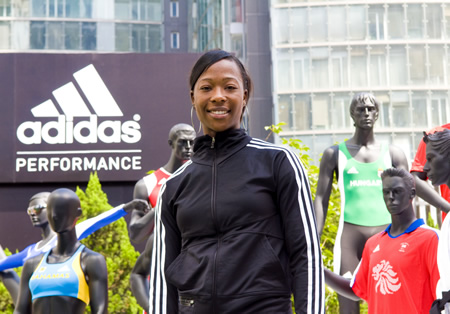
Photo: Women's 200m Olympian Marshevet Hooker of the USA at adidas Brand Center in Beijing, China, August 15, 2008. The new adidas Brand Center showcases and highlights the breadth and depth of the adidas brand to the Chinese consumers as well as to all visitors of the Olympic Games.
As the Olympic Games unfold, the branding experts at Siegel+Gale are commenting on topics such as how the Olympics are affecting the "brand" of China, how companies are using the Olympics to further their brands, specific corporate ad campaigns, branding through sports events in general, and other strategic branding and positioning issues.
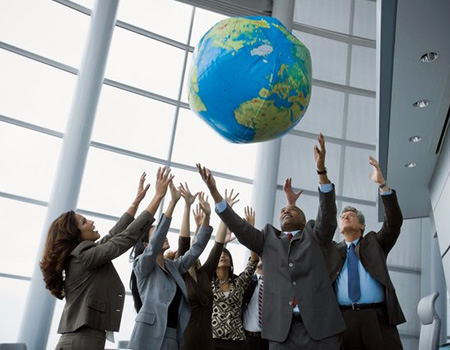
Following are some comments by Larry Vincent, Siegel+Gale's Group Director of Strategy in Los Angeles, and Julius Roberge, Siegel+Gale's Strategy Director in New York, most recently relocated from Shanghai:
Why Companies Align With the Olympics - Larry Vincent
• "Most companies align with the Olympics because they hope to borrow equity or transfer goodwill from that of the Olympics to their own brands."
• "Twenty years ago it was a slam dunk. McDonald's and Coca-Cola measured noticeable lifts in preference, favorability, and attitudes toward the brand during the co-brand window of the Games."
• "1984 was the turning point, however. The Los Angeles Games, in some ways, reinvented the sponsorship model (so much so that LA had a surplus of funds after the Games). It was so successful, that more brands wanted in."
• "Today, sponsors have changed quite a bit: there are more of them and the affiliation competes with branded partnerships in vastly more channels and platforms."
• "The Olympic equity is still strong (although research shows that it is the strongest when the Games are actually in progress), but it's harder to transfer or borrow the equity."
• "'False reporting' of 'unaided awareness' of Olympic sponsorships is on the rise (meaning, consumers attribute an Olympic sponsorship to the wrong company) and ambush tactics by other marketers are more prolific. In that context, you have to ask, 'What is the return on investment for a company that spends millions to sponsor the Games, and millions more to purchase the media that activates the sponsorship?'"
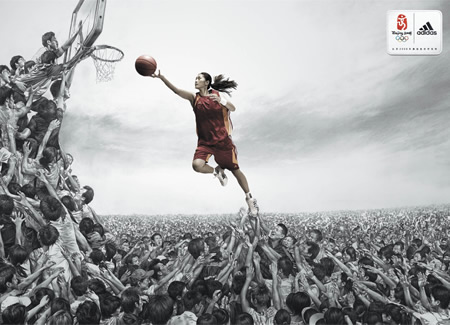
Photo: adidas Olympics advertising campaign: Together in 2008 - Impossible is Nothing.
• "It still works for some. We expect Adidas, Coca-Cola, and McDonald's will still do well. Part of that is the legacy. In Adidas' case, it's the innovative way they've gone to market."

"At the Beijing 2008 Olympics, American global giants are blindly following a crude and hazy sponsorship advertising policy. Consequently, their global brand equity enhancement is only a fraction of what they deserve for spending huge money on this pursuit.
While sponsoring the Beijing Games, their focus is on China. Excellent. But they, as well as America's top business commentators and writers, have put the rest of the world into oblivion. They seem to have no idea that without much further expenditure, these multinationals could have utilized this rare opportunity to firmly establish their brands throughout the world.
Localized print advertisements publicizing the company's privileged involvement in the 2008 Olympics, for example, would have won them universal goodwill and respect in all their target markets worldwide."
© GlobalGiants.Com
• "We do think the Olympics is a horrible place to debut new brands, however. There is too much clutter and competition."
• "It CAN be an effective place to reposition a brand, particularly if the brand is in the B2B space and the repositioning can occur onsite at the events. Many of the attendees of Olympic events are executives (just like the Super Bowl). UPS is using the Beijing Games as an interesting venue to debut some of their new international brand activity."
• "Intuitively, we should be seeing international companies getting more involved in the Games in the future. It can become the coming out event for large international companies who wish to elevate brand awareness on a global stage. But the challenge is that for many viewers, the brands will be so foreign they won't know who they are or what they do. It requires the brand to do a lot of seeding work before the Games begin, and very aggressive follow-up work once the brand has launched with the marks."
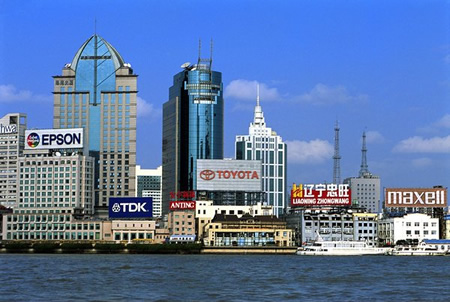

Photos: Shanghai, China.
The "China Brand" - Julius Roberge
• "Until China, never before has the market potential of the host country on its own been viewed as possibly worth the significant investment. Despite the degree of controversy before the Games began, the market opportunity seems irresistible."
• "The Olympics have a clear purpose for the "China" brand: to prove to the world that China is capable of hosting Games at a quality level that the Olympic brand, the athletes and spectators worldwide demand and expect."
• "The China brand today is often correlated with low quality (products), so the challenge is Herculean. With the world watching their every step, success in Beijing will send a strong new message about China as a world power. If it missteps, it will not soon have such visibility to transform a lagging image."
• "It's safe to assume Americans understand that Olympic sponsorship is not the same as supporting China's political policies. That said, given the ongoing buzz and interest in how China enters the world stage, how a brand behaves in and/or partners with China may draw more attention in the future from international media, thus elevating the potential for a negative effect on a brand's image. This may be more of a concern for B2B organizations that deal more closely with the Chinese government or in government monitored sectors."
Siegel+Gale is one of the world's premier strategic branding companies. The firm has worked with an array of leading organizations, including American Express, AARP, College Board, Cornell University, Dell, Duke University, Lexus, MBA.com, Merrill Lynch, Motorola, the National Basketball Association, 3M, Dow, and The Four Seasons Hotel Group, Sony, and Yahoo! Siegel+Gale has full-service offices in New York, Los Angeles, London, and Dubai and strategic partnerships around the world. Siegel+Gale is part of the Omnicom Group Inc., a leading global marketing and corporate communications company.
Source: Siegel+Gale
|GlobalGiants.com|







Edited & Posted by the Editor | 2:02 AM | Link to this Post







